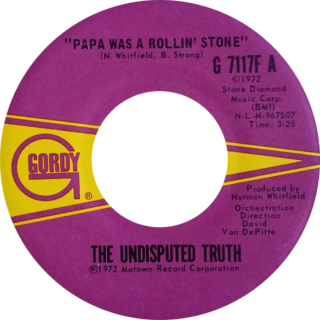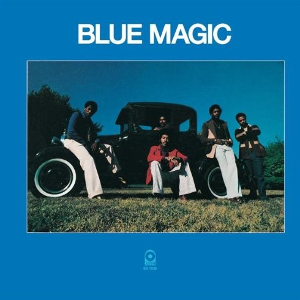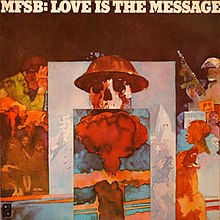
The Trammps are an American disco and soul band, who were based in Philadelphia and were one of the first disco bands.
MFSB, officially standing for "Mother Father Sister Brother", was a pool of more than 30 studio musicians based at Philadelphia's Sigma Sound Studios. They worked closely with the production team of Gamble and Huff and producer/arranger Thom Bell, and backed up Harold Melvin & the Blue Notes, the O'Jays, the Stylistics, the Spinners, Wilson Pickett, and Billy Paul.

"Papa Was a Rollin' Stone" is a song originally performed by Motown recording act the Undisputed Truth in 1972, though it became much better known after a Grammy-award winning cover by the Temptations was issued later the same year. This latter version of the song became a number-one hit on the Billboard Hot 100.

"TSOP (The Sound of Philadelphia)" is a 1974 recording by MFSB featuring vocals by The Three Degrees. It was written by Gamble and Huff as the theme for the American musical television program Soul Train, which specialized in African American musical performers. The single was released on the Philadelphia International Records label. It was the first television theme song to reach No. 1 on the Billboard Hot 100.

Blue Magic is an American R&B and soul group, and one of the more popular Philadelphia soul groups of the 1970s. Founded in 1972, the group's original members included lead singer Ted Mills with Vernon Sawyer, Wendell Sawyer, Keith Beaton, and Richard Pratt. Their most notable songs included smooth soul ballads such as "Sideshow", "Spell", "What’s Come Over Me", "Three Ring Circus", and "Stop to Start".
The Salsoul Orchestra was the backing band of session musicians for many acts on the New York City label Salsoul Records and, under its own name, recorded several hit singles and albums between 1975 and 1982.

"The Way We Were" is a song by American singer Barbra Streisand from her fifteenth studio album of the same name. It was released as the album's lead single on September 27, 1973, through Columbia Records. The 7" single was distributed in two different formats, with the standard edition featuring B-side track "What Are You Doing the Rest of Your Life?"; the Mexico release instead included an instrumental B-side. The song was written by Alan Bergman, Marilyn Bergman, and Marvin Hamlisch, while production was solely handled by Marty Paich. "The Way We Were" was specifically produced for the record, in addition to three other tracks, including her then-upcoming single "All in Love Is Fair" (1974).

"Yes, I'm Ready" is a song by Barbara Mason from her album Yes, I'm Ready (1965). It has been covered by numerous artists, and was a hit single for Teri DeSario and K.C. when they recorded a duet version in 1980.

"Love Train" is a hit single by the O'Jays, written by Kenny Gamble and Leon Huff. Released in 1972, it reached No. 1 on both the R&B Singles and the Billboard Hot 100 in February and March 1973 respectively, and No. 9 on the UK Singles Chart and was certified gold by the RIAA. It was the O'Jays' first and only number one record on the US pop chart. The song has been considered one of the first songs of disco music.

"I Won't Last a Day Without You" is a song by The Carpenters with lyrics written by Paul Williams and music composed by Roger Nichols. The writing duo had previously contributed "We've Only Just Begun" and "Rainy Days and Mondays" to the Carpenters.

"Rock the Boat" is a song by American trio The Hues Corporation, written by Wally Holmes. "Rock the Boat" was first featured on their 1973 debut studio album Freedom for the Stallion. It was released as the third single from the album in early 1974, to follow up Stallion's title song, which had peaked at number sixty-three on the Hot 100, and "Miracle Maker " which did not chart.

"I'll Be Around" is a song recorded by the American R&B vocal group The Spinners. It was co-written by Thom Bell and Phil Hurtt and produced by Bell.

"Kiss and Say Goodbye" is a 1976 song by American R&B vocal group the Manhattans. It was written by group member Winfred Lovett, the bass singer and songwriter of the group, who did the song's spoken introduction. The song was recorded for the album The Manhattans, released in 1976 by Columbia Records, and was released as a single in March of the same year. "Kiss and Say Goodbye" became a worldwide success, appearing in the musical charts of countless countries, a Top 10 hit in many countries, including No. 1 in the US, Belgium, Netherlands, New Zealand, and in Europe (European Hot 100 Singles). With the exception of the Adult Contemporary Chart, "Kiss and Say Goodbye" was ranked number 1 in the US on all pop and R&B singles charts. The song was one of the biggest hits of 1976 and of the 1970s.
Clifford James Nobles was an American soul singer, who is best known for his instrumental hit, "The Horse".

"Feel Like Makin' Love" is a song composed by singer-songwriter and producer Eugene McDaniels, and recorded originally by soul singer-songwriter Roberta Flack. The song has been covered by R&B and jazz artists including D’Angelo, Roy Ayers, Gladys Knight & the Pips, Lou Rawls, Isaac Hays, George Benson, Jeffrey Osborne, Larry Coryell, Johnny Mathis, and Marlena Shaw.

Blue Magic is the eponymous debut album by American soul group Blue Magic, produced by Norman Harris and released in 1974 on the Atco label.
"The Horse" is an instrumental song by Cliff Nobles and Company. It was released as the B-side of the single "Love Is All Right" and is simply an instrumental version of that song.
Bobby Eli was an American musician, arranger, composer and record producer from Philadelphia. He was a founding member and lead guitarist of Philadelphia studio band MFSB.
This is the discography of American female vocal group the Three Degrees.

Dennis Harris is an American session guitarist, songwriter and arranger. Historically he played a significant part in the Philly Sound, playing on many of the hits during the 1970s. The hits include, "Only the Strong Survive" by Billy Paul, "Ain't No Stoppin' Us Now" by McFadden & Whitehead and "Lady Love" by Lou Rawls. He also played the guitar intro on Rawls' hit "You'll Never Find Another Love like Mine". He is a former member of The Philly Groove Orchestra, The Trammps, MFSB and The Salsoul Orchestra. In recent years he has been part of the New MFSB. He is also a guitar teacher.













